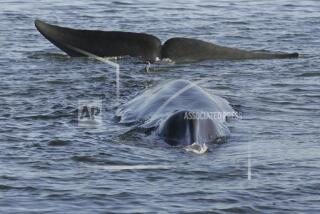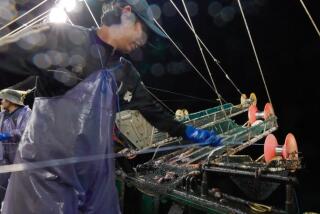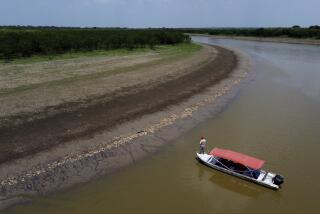Peru vows to investigate report of massive dolphin slaughter
LIMA, Peru — The Peruvian government has promised to investigate charges by an environmental group that the out-of-control slaughter of dolphins in Pacific coastal waters has put the ocean mammal at risk.
At least 15,000 dolphins are being killed off the Peruvian coast annually by fishermen who use them as shark bait, the environmental watchdog group Asociacion Mundo Azul, or Blue World Assn., said late Saturday. The organization conducted a months-long undercover investigation by placing informants aboard fishing vessels.
Killing of dolphins was outlawed by Peru’s legislature in 1997, but Stefan Austermuhle, executive director of Blue World, said fishermen have continued to target the mammals, which they harpoon, for bait.
Sharks, an increasingly coveted catch for meat sold in Peru and for fins sold on the black market in Asia, are also depleting rapidly, he said.
“This ecological crime is an open secret in Peruvian fishing,” Austermuhle said in an interview, adding that most fishermen spear the dolphins swimming in schools as far as 50 miles from the coastline. Austermuhle himself accompanied fishermen and filmed the harpooning of several dolphins.
His group calculates the approximate number of dolphins killed each year by multiplying the number of registered fishermen’s boats by the average number of annual trips, and multiplies that number by the two to six dolphins that fishermen kill per trip on average, according to the organization’s on-board intelligence.
“The fishermen even buy harpoons known as ‘dolphin killers,’” he said. “This happens in front of the entire world and no one does anything.”
Peru’s vice minister in charge of fishing, Paul Phumpiu, said Saturday that the government has initiated an investigation into the charges and that it will complete the probe by June.
Gonzalo Llosa, a consultant to Peru’s environment ministry, said in an interview that evidence gathered by Blue World had been forwarded to environmental police to demonstrate “the level of cruelty that is going on, as well as total impunity.”
The consultant added that education programs sponsored by regional and local governments are the answer to the slaughter. “We can attack this best as a social problem,” Llosa said.
Shark killing is not prohibited but is tightly controlled. Catching sharks that measure less than five feet in length is illegal. Illicit fishing boats targets juvenile sharks, a practice that over time has put Peruvian coastal shark populations “on the verge of collapse,” Austermuhle said.
Blue World and other groups warn that killing of dolphins and sharks poses a threat to coastal food chains. Fishermen along Panama’s Pacific coast, for example, have said that shrimp and lobster populations have vanished because the killing of sharks has eliminated a natural predator of the octopus, which feed on shellfish.
ALSO:
Syrian rebels release 9 Lebanese hostages
Greek police find mystery child during raid on Roma camp
Titanic violin auction price of $1.44 million sinks previous records
Special correspondents Leon and Kraul reported from Lima and Bogota, Colombia, respectively.
More to Read
Sign up for Essential California
The most important California stories and recommendations in your inbox every morning.
You may occasionally receive promotional content from the Los Angeles Times.










